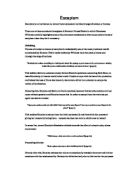In 'A Streetcar Named Desire' how are the characters Stanley, Stella and Blanche introduced by Tennessee Williams, in the first scene?
In ‘A Streetcar Named Desire’ how are the characters Stanley, Stella and Blanche introduced by Tennessee Williams, in the first scene?
Tennessee Williams's play, "A Streetcar Named Desire," contains more within its characters, situations and story than appears on its surface. Symbolism and interesting characters are used a lot in order to draw in and involve the audience. The plot of "A Streetcar Named Desire" alone does not captivate the audience. It is Williams's brilliant and intriguing characters that make it so.
Williams immediately establishes Stanley and Blanche as polar opposites, with Stella as the link between them. Stage directions describe Stanley as a virulent character whose chief pleasure is women. His dismissal of Blanche's beauty is therefore significant, because it shows that she does not exude his same brand of carnal desire. On the other hand, Blanche's delicate manners and sense of propriety are offended by Stanley's brutish virility. Stanley's qualities—variously described as vitality, heartiness, brutality, primitivism, lust for life, animality—lead him over the course of the play into an unrelenting, unthinking assault on the already crumbling facade of Blanche's world.







